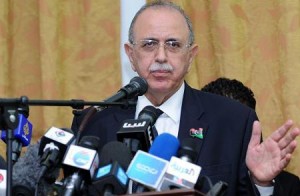Special to WorldTribune.com
CAIRO — Rebels have been named to key ministries in Libya’s
interim government.
Interim Prime Minister Abdul Rahim Al Kib named rebels to head the
Defense Ministry, Energy Ministry, Foreign Ministry and Interior Ministry.
The 24-member Cabinet was approved by the National Transitional Council and
ministers were expected to resolve disputes with the numerous militias
formed during the war against the late Col. Moammar Gadhafi.

“I can reassure everyone: all of Libya is [represented] in the new
government,” Al Kib told a news conference on Nov. 22.
The new defense minister was identified as Osama Al Juwali, a former Libyan Army officer and head of the rebel military council in Zintan. On Nov. 19, Al Juwali’s force captured the son of the Gadhafi, Seif Al Islam. Al Juwali’s appointment was unexpected and his candidacy emerged after the capture of Seif, said to be held in the Western Mountains near the border with Tripoli.
“The Zintan military council denies the information published by media according to which Zintan is involved in blackmail regarding Seif Al Islam in return for a Cabinet post,” the Zintan council said in a statement.
Officials, however, acknowledged that Al Juwali’s appointment has been
opposed by Islamist rebel commanders. They said the interim government would
run Libya until national elections, expected by mid-2012.
The interim minister was identified as Fawzi Abdul Ali, a rebel
commander in Misrata who captured the senior Gadhafi in October. Ahur Bin
Khayal, a former diplomat under Gadhafi, was named foreign minister, and
Abdul Rahman Bin Yaza became energy minister.
Despite their role in the revolt, Islamists were not named to key
Cabinet posts. Tribal chiefs were also said to have failed to make gains in
the interim government.
“We will use competence as a basic measure and this way we will be able
to include all of Libya’s regions,” Al Kib said. “You will see. We’re
working hard to ensure that what we have is something solid, cohesive, capable of
doing the job.”

You must be logged in to post a comment Login